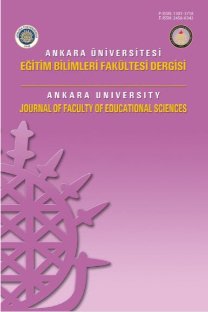Avrupa Birliği’nin Yaşam Boyu Öğrenme Politikaları Bağlamında İngiltere, Danimarka ve Türkiye’nin Yetişkin Eğitimi Sistemlerinin Karşılaştırmalı Analizi
Comparative Analyses of Adult Education Systems of England, Denmark, and Turkey in the Context of The Lifelong Learning Policies of the European Union
___
- Bağcı, Ş. E. (2011). Lifelong Education Policies in Turkey In The Process of European Union Membership [Avrupa Birliğine üyelik sürecinde Türkiye'de yaşam boyu eğitim politikaları]. Ondokuz Mayıs University Journal of Education of Faculty [Ondokuz Mayıs Üniversitesi Eğitim Fakültesi Dergisi], 30(2), 139-173. Retrieved from https://www.pegem.net/dosyalar/dokuman/137995-2013101015553-makale7.pdf
- Basic Law of National Education [Milli Eğitim Temel Kanunu]. (No. 1739, 06.14.1973). Official Gazette, 14574, 01.24.1973.
- Business, Innovation and Skills (BIS). (2010). Skills for sustainable growth. Retrieved from https://www.gov.uk/government/publications/skills-for-sustainablegrowth-strategy-document
- Business, Innovation and Skills (BIS). (2013). Rigour and responsiveness in skills. Retrieved from https://www.gov.uk/government/publications/rigour-andresponsiveness-in-skills
- Danish Ministry of Education (DMoE) (2007). Denmark’s strategy for lifelong learning-Education and lifelong skills upgrading for all. Report to the European Commission. Retrieved from https://planipolis.iiep.unesco.org/en/2007/denmarks-strategy-lifelong-learningeducation-and-lifelong-skills-upgrading-all-report-european
- Danish Ministry of Education (DMoE). (2016a). Nonformal adult education. Retrieved from http://eng.uvm.dk/Education/Adult-education-and-continuingtraining/Nonformal-adulteducation
- Danish Ministry of Education (DMoE). (2016b). The general adult education programme. Retrieved from http://eng.uvm.dk/Education/Adult-education-andcontinuing-training/The-General-Adult-Education-Programme.
- Danish Ministry of Education (DMoE). (2016c). Adult education and continuing training. Retrieved from http://eng.uvm.dk/Education/Adult-education-andcontinuing-training
- Decree Law on Organization and Duties of Ministry of National Education [Millî Eğitim Bakanlığının Teşkilat ve Görevleri Hakkında Kanun Hükmünde Kararname]. (No. 6764, 12.02.2016). Official Gazette[Resmi Gazete], 29913, 12.09.2016.
- Demirel, M., and Yağcı, E. (2012). Perceptions of Primary School Teacher Candidates About Lifelong Learning [Üniversite öğrencilerinin yaşam boyu öğrenmeye ilişkin algıları]. Hacettepe University Journal of Educations [Hacettepe Üniversitesi Eğitim Fakültesi Dergisi], 1(Special Issue[Özel Sayı]), 100-111.
- EAEAC Eurydice. (2016a). Denmark. adult education and training/main providers. Retrieved from https://webgate.ec.europa.eu/fpfis/mwikis/eurydice/index.php/Denmark:Main_ Providers
- EAEAC Eurydice. (2016b). Denmark. Adult Education and Training/Main Types of Provision. Retrieved from https://webgate.ec.europa.eu/fpfis/mwikis/eurydice/index.php/Denmark:Main_ Types_of_Provision
- European Commission (EC). (1993). White paper on growth, competitiveness and employment. The challenges and the ways forward forthe 21st century. Retrieved from file:///C:/Users/User/Desktop/gp_eudor_PDFA1B_CM8294529ENC_001.pdf.e n.pdf
- European Commission (EC). (2009). Education and Training 2020. Retrieved from http://ec.europa.eu/education/policy/strategic-framework/index_en.htm
- EUROSTAT. (2016). Lifelong learning statistics. Retrieved from http://appsso.EUROSTAT.ec.europa.eu/nui/show.do?dataset=trng_lfs_01&lan g=en
- Field, J. (2010). Lifelong learning. Retrieved from http://booksite.elsevier.com/brochures/educ/PDF/Lifelong_Learning.pdf
- Green, A. (2005, September). Models of lifelong learning and the knowledge economy/society in Europe: what regional patterns are emerging? European Conference on Educational Research Conference Preceedings. Retrieved from http://www.leeds.ac.uk/educol/documents/00003902.htm
- Kogan, M. (2000). Lifelong learning in the UK. European Journal of Education, 35(3), 343-359.
- Larson, A., and Milana, M. (2011). Professionalization of adult educators in Denmark. Denmark International Journal of Continuing Education and Lifelong Learning, 3(2), 75-89.
- Milana, M. (2012). Political globalization and the shift from adult education to lifelong learning. European Journal for Research on the Education and Learning of Adults, 3(2), 103-117. doi: 10.3384/rela.2000-7426.rela0070
- Nicholls, G. (2000). Professional development, teaching, and lifelong learning: the implications for higher education. International Journal of Lifelong Education, 19(4), 370-377. doi: 10.1080/02601370050110419
- Prokou, E. (2004). Globalisation, knowledge society and lifelong learning. Adult Education: A Journal of the Hellenic Adult Education Association, 2, 4-10.
- Regulation on Non-Formal Education Institutions [Milli Eğitim Bakanlığı Yaygın Eğitim Kurumları Yönetmeliği] (2010). Official Gazette [Resmi Gazete], 27587, 05.21.2010.
- Regulation on Vocational and Technical Education [Mesleki ve Teknik Eğitim Yönetmeliği] (2008). Official Gazette [Resmi Gazete], 27003, 09.20.2008.
- Rizvi, F., and Lingard, B. (2000). Globalization and education: Complexities and contingencies. Educational Theory, 50(4), 419-426. doi: 10.1111/j.1741- 5446.2000.00419.x
- Sayılan, F. (2001). As the paradigm changes: Globalization and lifelong education [Paradigma değişirken: Küreselleşme ve yaşam boyu eğitim]. In A Gift to Cevat Geray [Prof. Dr. Cevat Geray’a armağan] (pp. 609-624). Ankara: Union of Political Science Publications [Mülkiyeliler Birliği Yayınları], No: 25.
- Smith, A. (2002). The EU Memorandum on Lifelong Learning. C. Medel-Anonuevo (Ed.), In Integrating lifelong learning perspectives (pp. 47-52). UNESCO Institute for Education.
- Turkish Ministry of Education (TMoE) [Türkiye Milli Eğitim Bakanlığı] (2009). Turkey Lifelong Learning Strategy Document [Türkiye hayat boyu öğrenme strateji belgesi]. Retrieved from http://mesbil.meb.gov.tr/genel/hayat%20boyu%20öğrenme%20dokuman.pdf T urkish Ministry of Education (TMoE) [Türkiye Milli Eğitim Bakanlığı] (2014). Turkey lifelong learning strategy document and action plan 2014-2018 [Türkiye hayat boyu öğrenme strateji belgesi ve eylem planı (2014-2018)]. Retrieved from http://hbogm.meb.gov.tr/str/str.html
- United Nations Development Programme (UNDP). (2015). Human Development Report. 2015. Retrieved from http://hdr.undp.org/en/data
- United Nations Educational, Scientific and Cultural Organization (UNESCO). (1972). Learning to be: The world of education today and tomorrow. Paris: UNESCO.
- Vocational Education Law [Mesleki Eğitim Kanunu] (No: 3308, 06.02.1986). Official Gazette [Resmi Gazete], 19139, 06.19.1986.
- Vocational Qualifications Institution Law [Mesleki Yeterlilik Kurumu Kanunu] (No: 5544, 21.09.2006). Official Gazette, 26312, 07.10.2006.
- Yıldız, A. (2012). Transformation of adult education in Turkey: Form public education to life-long learning. Kemal İnal, and Güliz Akkaymak (Ed.), In Neoliberal transformation of eductaion in Turkey. (p. 245-257). Palgrave Macmillan.
- ISSN: 1301-3718
- Yayın Aralığı: 3
- Başlangıç: 1968
- Yayıncı: ANKARA ÜNİVERSİTESİ (EĞİTİM BİLİMLERİ FAKÜLTESİ)
Rehberlik ve Araştırma Merkezleri Rehberlik Hizmetleri Bölümünün İşlevselliğinin İncelenmesi
Serap NAZLI, Semra KİYE, Orhan YONCALIK, Aslı AŞÇIOĞLU ÖNAL, Nesime CAN, Elif Gülçin ÇELİK ATEŞ
Bebeklerin Teknolojik Araçları Kullanmalarıyla İlgili Anne Görüşleri
Nesrin IŞIKOĞLU ERDOĞAN, Erinç ERGENEKON
Türkçe Dersi Öğretim Programında Sosyal-Duygusal Öğrenme Becerilerinin Kapsamının Belirlenmesi
Hanife ESEN AYGÜN, Çiğdem ŞAHİN TAŞKIN
Zeynep KILIÇ, Hilal İlknur TUNÇELİ, Fatma Özge ÜNSAL
Türkiye’de Yabancı Dil Olarak İngilizce Öğrenen Öğrencilere Göre Dil Öğrenmeyi Zorlaştıran Etkenler
